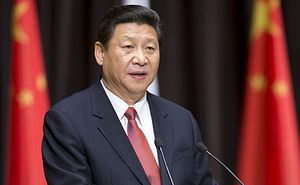I was heartened last week to read a piece in Foreign Affairs by Eric Li, a Chinese venture capitalist and political commentator, in which he asserts that “unprecedented” political reforms are underway in China [registration required]. Somehow I had missed them, mistakenly thinking that President Xi Jinping was tightening political control rather than offering greater opportunities for political participation.
Fortunately, Mr. Li cleared up my confusion: President Xi tightening the reins of control is political reform. At the top of Beijing’s reform list, as Li elaborates, is fiscal reform, in which Beijing will now “assume almost complete authority over national spending.” For Li this means greater spending on social welfare, the strengthening of China’s market economy, and better enforcement on issues such as environmental protection and food safety. These are all potential positive political implications of a bureaucratic/financial reform; we will have to wait to see how Beijing exercises its increased power. Second on the list is another bureaucratic reform to strengthen anti-corruption efforts. Beijing has announced that local disciplinary committees and courts will report directly up the bureaucratic chain to higher-level committees and courts rather than be responsible to local governments. This indeed could be transformational—I have long believed, for example, that it would be useful to have local environmental protection bureaus funded and overseen by the Ministry of Environmental Protection rather than responsive to local officials. Yet when Li calls the system one of an “independent watchdog,” he is jumping the gun. These committees and courts will still be controlled by party officials; the difference is they will take their party mandates from Beijing rather than from local party officials. An independent watchdog would remove the party from the court system entirely. Finally, Li points to the decision by the top leadership to concentrate security and economic policy firmly in the hands of Xi Jinping himself as a new reform initiative. Here, too, is another bureaucratic reform that contributes to a greater concentration of power, in this case a single Chinese leader.
Li acknowledges that few political observers other than himself have recognized the Communist Party’s actions as significant political reform, attributing this to the fact that the term “political reform” has been “ideologically hijacked” by Western media outlets and think tanks to mean only those reforms related to a multiparty democracy. Of course, this is a straw man: few, if any, people would define political reform as only those reforms that embrace multiparty democracy. Many, including those in China, however, would understand political reform as an opening of the political system to more rather than less public participation. It is not merely Western media outlets and think tanks that have “downplayed” the CCP leadership and Li’s version of political reform. In a recent New York Times interview with former senior Chinese official Wu Wei, Wu claims that the recent plenum offers “no advances apart from some adjustments needed to maintain growth… Especially in politics the controls on opinion are a major step backward.” About the current leadership he notes, “I don’t think they have a good understanding of the reforms of the ‘80s. In particular, they haven’t studied the political reforms of that time, or why there needs to be a separation between party and government, or why we need to develop democracy and rule of law, or why we need to ensure citizens’ fundamental rights. And they’re not interested in understanding.” Certainly Wu’s understanding of political reform must resonate with other Chinese. How else to explain the ten or twenty million followers of Chinese bloggers who call for greater transparency and political participation, the tens of thousands of Chinese who protest against one injustice or another every year, or the scores of Chinese people who attempt to run as independent candidates in local elections?
Li is correct that there should be room to understand the bureaucratic reforms he describes as a form of political reform. However there is no need to try to devalue the worth of democracy, transparency, the rule of law, and public participation by calling them Western concoctions. President Xi’s brand of political reform may represent Li’s personal China dream but he should allow that for millions of other Chinese, political reform has little to do with more power to the Party and everything to do with more power to the people.
Elizabeth C. Economy is C.V. Starr Senior Fellow and Director for Asia Studies at the Council on Foreign Relations. She is an expert on Chinese domestic and foreign policy and U.S.-China relations and author of the award-winning book, The River Runs Black: The Environmental Challenge to China’s Future. She blogs at Asia Unbound, where this piece originally appeared.

































